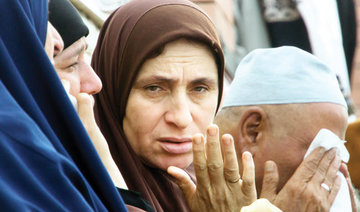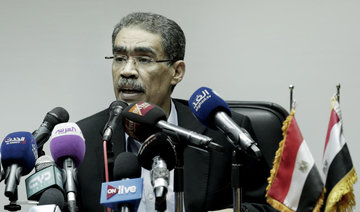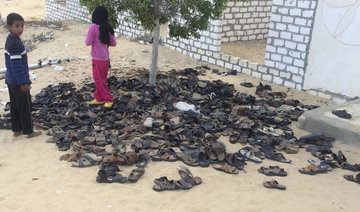ISMAILIA, Egypt: The imam had barely made it atop the mosque pulpit to deliver the sermon when intense gunfire rang out and Ebid Salem Mansour knew exactly what was going on.
“We knew that the mosque was under attack by (militants),” he said Saturday, a day after the attack, giving a detailed account of the deadliest assault by extremists against civilians in Egypt’s modern history.
At least 235 people were killed and more than a 100 wounded in Friday’s attack on a mosque filled with worshippers in the troubled region of northern Sinai.
Witnesses speaking to The Associated Press in the Suez Canal city of Ismailia where some of the wounded were taken spoke of horrific scenes during the approximately 20 minutes it took the militants to kill and maim worshippers. They spoke of some jumping out of windows, a stampede in a corridor leading to the washrooms and of children screaming in horror. Some spoke of their narrow escape from a certain death, others of families that lost all or most of their male members.
Mansour, a 38-year-old worker in a nearby salt factory, said he settled in Bir Al-Abd, the small town where the attack took place, three years ago to escape the bloodshed and fighting elsewhere in northern Sinai. He suffered two gunshot wounds in the legs.
“The shooting was random and hysterical at the beginning and then became more deliberate: Whoever they weren’t sure was dead or still breathing was shot dead,” Mansour said.
“I knew I was injured but I was in a situation that was much scarier than being wounded. I was only seconds away from a certain death,” he said. As the shooting took place, many of the worshippers recited their final prayers, he added.
The militants descended on the mosque in four off-road vehicles as hundreds worshipped inside. At least a dozen attackers charged in, opening fire randomly, the main cleric at the mosque, Sheikh Mohamed Abdel Fatah Zowraiq, said. He spoke to the AP by phone from a Nile Delta town where he was recuperating from bruises and scratches suffered in the attack.
The militants, according to one witness, stormed the mosque from several doors and as soon as they opened fire, many worshippers started jumping out of windows.
“The small door that leads to the corridor for the wash rooms was about the only one where worshippers rushed to escape,” said a 38-year-old government employee who did not want to be named for fear of retaliation. “There was a stampede. I fell down and then bodies piled up on top of me. I was the only one alive underneath.”
“The shooting was heavy, insane and random,” he recalled. “These are not terrorists. These are not humans.”
Survivors offer horrific accounts of mosque carnage
Survivors offer horrific accounts of mosque carnage

Parliamentary Foreign Vice-Minister Matsumoto to visit Saudi Arabia, Jordan

TOKYO: Japan’s Parliamentary Vice-Minister for Foreign Affairs Matsumoto Hisashi will visit the Kingdom of Saudi Arabia and Jordan from Jan. 11 to 15, the foreign ministry said on Friday.
During the visit, Matsumoto is scheduled to exchange views with government officials of Saudi Arabia and Jordan on bilateral relations as well as regional and international situations.
Matsumoto is scheduled to arrive in Riyadh on Jan. 12, according to the ministry.
A version of this article appeared on Arab News Japan.
Lebanon PM to visit new Damascus ruler on Saturday

- Lebanon’s Prime Minister Najib Mikati will on Saturday make his first official trip to neighboring Syria since the fall of president Bashar Assad, his office told AFP
Mikati’s office said Friday the trip came at the invitation of the country’s new de facto leader Ahmed Al-Sharaa during a phone call last week.
Syria imposed new restrictions on the entry of Lebanese citizens last week, two security sources have told AFP, following what the Lebanese army said was a border skirmish with unnamed armed Syrians.
Lebanese nationals had previously been allowed into Syria without a visa, using just their passport or ID card.
Lebanon’s eastern border is porous and known for smuggling.
Lebanese Shiite group Hezbollah supported Assad with fighters during Syria’s civil war.
But the Iran-backed movement has been weakened after a war with Israel killed its long-time leader and Islamist-led rebels seized Damascus last month.
Lebanese lawmakers elected the country’s army chief Joseph Aoun as president on Thursday, ending a vacancy of more than two years that critics blamed on Hezbollah.
For three decades under the Assad clan, Syria was the dominant power in Lebanon after intervening in its 1975-1990 civil war.
Syria eventually withdrew its troops in 2005 under international pressure after the assassination of Lebanese ex-prime minister Rafic Hariri.
UN says 3 million Sudan children facing acute malnutrition

- Famine has already gripped five areas across Sudan, according to a report last month
- Sudan has endured 20 months of war between the army and the paramilitary forces
PORT SUDAN, Sudan: An estimated 3.2 million children under the age of five are expected to face acute malnutrition this year in war-torn Sudan, according to the United Nations Children’s Fund (UNICEF).
“Of this number, around 772,000 children are expected to suffer from severe acute malnutrition,” Eva Hinds, UNICEF Sudan’s Head of Advocacy and Communication, told AFP late on Thursday.
Famine has already gripped five areas across Sudan, according to a report last month by the Integrated Food Security Phase Classification (IPC), a UN-backed assessment.
Sudan has endured 20 months of war between the army and the paramilitary Rapid Support Forces (RSF), killing tens of thousands and, according to the United Nations, uprooting 12 million in the world’s largest displacement crisis.
Confirming to AFP that 3.2 million children are currently expected to face acute malnutrition, Hinds said “the number of severely malnourished children increased from an estimated 730,000 in 2024 to over 770,000 in 2025.”
The IPC expects famine to expand to five more parts of Sudan’s western Darfur region by May — a vast area that has seen some of the conflict’s worst violence. A further 17 areas in western and central Sudan are also at risk of famine, it said.
“Without immediate, unhindered humanitarian access facilitating a significant scale-up of a multisectoral response, malnutrition is likely to increase in these areas,” Hinds warned.
Sudan’s army-aligned government strongly rejected the IPC findings, while aid agencies complain that access is blocked by bureaucratic hurdles and ongoing violence.
In October, experts appointed by the United Nations Human Rights Council accused both sides of using “starvation tactics.”
On Tuesday the United States determined that the RSF had “committed genocide” and imposed sanctions on the paramilitary group’s leader.
Across the country, more than 24.6 million people — around half the population — face “high levels of acute food insecurity,” according to IPC, which said: “Only a ceasefire can reduce the risk of famine spreading further.”
Turkiye says France must take back its militants from Syria

- Ankara is threatening military action against Kurdish fighters in the northeast
- Turkiye considers the Kurdish-led Syrian Democratic Forces as linked to its domestic nemesis
ISTANBUL: France must take back its militant nationals from Syria, Turkiye’s top diplomat said Friday, insisting Washington was its only interlocutor for developments in the northeast where Ankara is threatening military action against Kurdish fighters.
Foreign Minister Hakan Fidan insisted Turkiye’s only aim was to ensure “stability” in Syria after the toppling of strongman Bashar Assad.
In its sights are the Kurdish-led Syrian Democratic Forces (SDF) which have been working with the United States for the past decade to fight Daesh group militants.
Turkiye considers the group as linked to its domestic nemesis, the Kurdistan Workers Party (PKK).
The PKK has waged a decades-long insurgency in Turkiye and is considered a terror organization by both Turkiye and the US.
The US is currently leading talks to head off a Turkish offensive in the area.
“The US is our only counterpart... Frankly we don’t take into account countries that try to advance their own interests in Syria by hiding behind US power,” he said.
His remarks were widely understood to be a reference to France, which is part of an international coalition to prevent a militant resurgence in the area.
Asked about the possibility of a French-US troop deployment in northeast Syria, he said France’s main concern should be to take back its nationals who have been jailed there in connection with militant activity.
“If France had anything to do, it should take its own citizens, bring them to its own prisons and judge them,” he said.
Lebanese caretaker PM says country to begin disarming south Litani to ensure state presence

- Najib Mikati: ‘We are in a new phase – in this new phase, we will start with south Lebanon and south Litani’
DUBAI: Lebanese caretaker Prime Minister Najib Mikati said on Friday that the state will begin disarming southern Lebanon, particularly the south Litani region, to establish its presence across the country.
“We are in a new phase – in this new phase, we will start with south Lebanon and south Litani specifically in order to pull weapons so that the state can be present across Lebanese territory,” Mikati said.




















